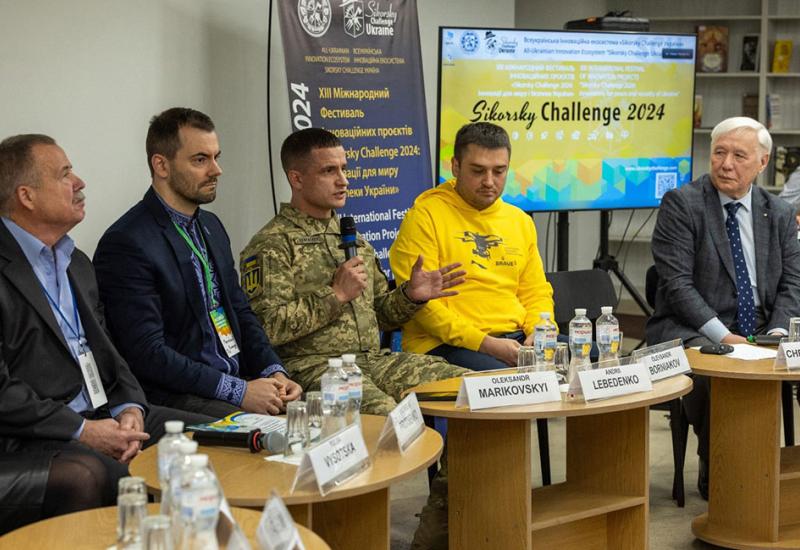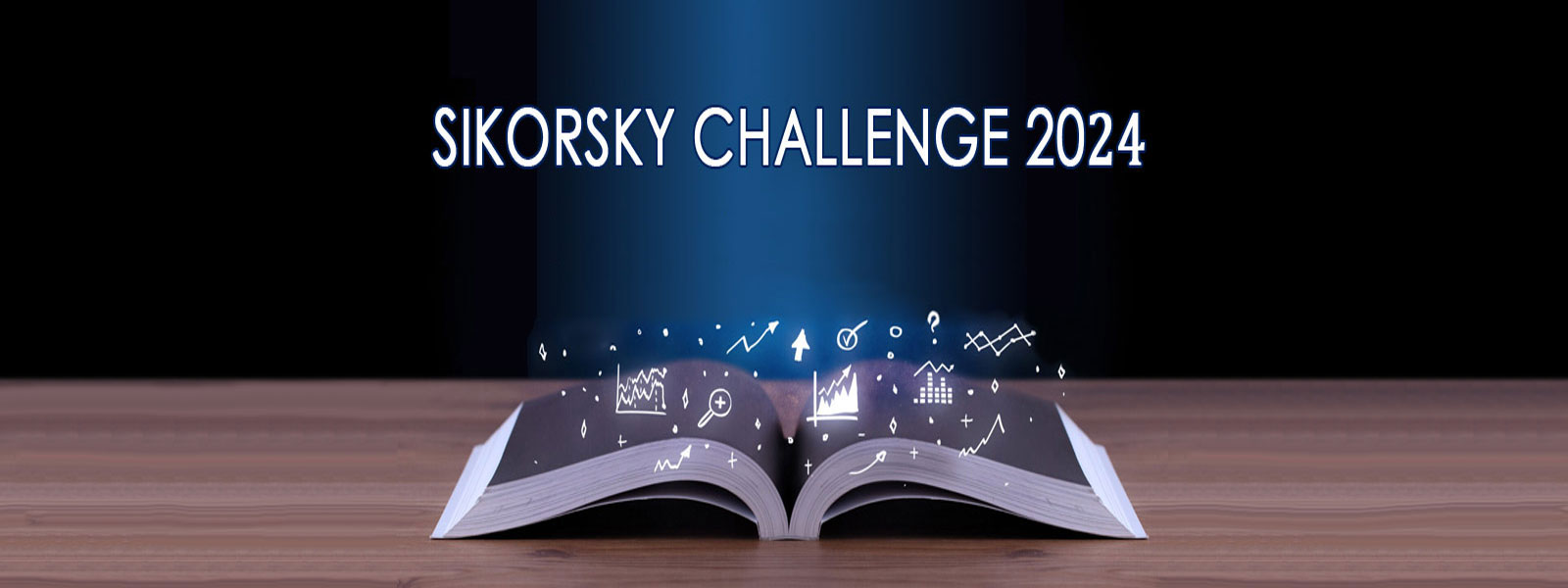The traditional All-Ukrainian Festival of Innovative Projects “Sikorsky Challenge”, which takes place every fall at Igor Sikorsky Kyiv Polytechnic Institute, has recently seemed to grow up: for several years in a row, it has been getting rid of unnecessary pathos and ceremonies not quite typical for scientific and engineering competitions, becoming more businesslike and strict.
The author heard this opinion on the sidelines of this year's thirteenth Sikorsky Challenge 2024, which was subtitled “Innovations for Peace and Security of Ukraine,” from several of its regular participants. So this year's festival, whose events took place from October 29 to November 3 in the CLUST Space of the University's Scientific and Technical Library, was no exception. It is worth recalling that exactly two years ago, the project of this shelter was awarded at the Eleventh Festival of Innovative Projects “Sikorsky Challenge 2022”, and now, after its implementation, it has become one of the main venues for various forums, conferences, seminars, and other events at the university. The reason is clear: when planning any event, the organizers must first of all take into account the need to ensure the safety of their participants - this is a requirement of wartime.
💥
“Our festival is an extraordinary event. In fact, over the years, it has become a national event that brings together inventors, innovators, and scientists from all over the country. “This year's festival has traditionally attracted a lot of attention from our partners from government agencies, high-tech business, and, most importantly, from those who participate in it as direct participants,” said Anatoliy Melnychenko, Rector of Igor Sikorsky Kyiv Polytechnic Institute, in his welcoming speech to the participants, jury members and guests of the festival. Moreover, after gaining the long-awaited victory, it will be necessary to restore our country. This reconstruction should be based on a new technological base that will ensure the rapid development of the state. That is why, of course, festivals of our level and events like this, which allow us to find growth points, remain and will remain extremely important for many years.”
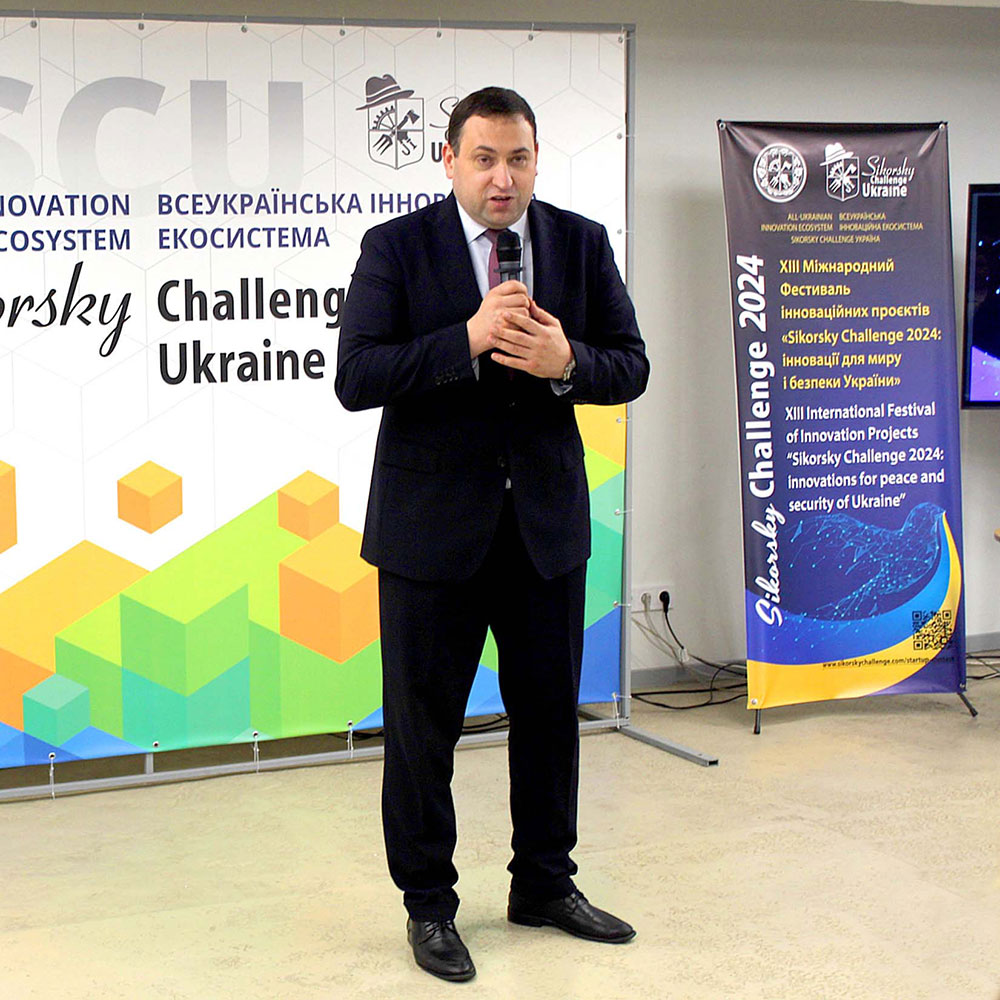
The fact that the Sikorsky Challenge is a very important event in the lives of Ukrainian innovators is also evidenced by the statistics provided by the moderator of most festival events, Sergiy Sergiyenko. According to him, this year 140 project applications were submitted for participation in the festival, of which the jury admitted 65 to the final. The online form registered 400 guests for the festival, of whom, despite the war, 350 people were physically present at the KPI library, where the festival activities took place (last year there were significantly fewer participants). The geography of the festival has also expanded: people who worked at the festival as participants, experts or jury members represented 19 countries! Among them were 70 experts from Ukraine, the United Kingdom, the United States, Spain, Poland, Latvia, Georgia, Japan, and Saudi Arabia. So, as Serhiy Sergienko noted, one of the challenges for the organizers was the need to synchronize the timely provision of the floor to all those who wished to speak, no matter what time zone they were in. Needless to say, it was possible to participate in the festival directly in Kyiv and, in parallel, online from any other country.
The war and the need to unite and work together to bring victory closer determined the focus of the festival program and almost all the sections in which the contestants presented their projects. This is evidenced even by their topics: section 1 - Aviation, Space, Defense and Security; section 2 - Energy Sustainability and Security; section 3 - Environmental Safety and Humanitarian Demining; section 4 - Biomedical Engineering and Human Health, which, by the way, included the presentation of the Sikorsky Challenge Science Park of Additive Technologies. Challenges and Prospects” and a panel discussion on ‘The Latest Technologies for Prosthesis and Prosthetics Production’; Section 5 - ‘Digital Country, Artificial Intelligence, Cybersecurity’; Section 6 - ‘Infrastructure and Industrial High-Tech’ and Section 7 - ‘Agrotech and Food Security’. The final section was the Sikorsky Challenge Junior, which was attended by the youngest participants of the festival - members of the Junior Academy of Sciences and students of lyceums, gymnasiums and schools from Kyiv and different parts of our country. By the way, one should not be deceived by the names of the fourth and sixth sections, which seem to be unrelated to the most pressing defense and civilian protection issues for Ukraine today - most of the projects submitted to them concerned either the problems of restoring the health of people who were injured or maimed at the front or as a result of the war, or the creation of technologies for the revival and rapid reconstruction of the country. Moreover, the festival also included forums “Innovations in the Defense Industry” and “International Support for Ukraine's Innovative Transformation” as well as a panel discussion “Leapfrog of Ukraine's Innovative Development. Interaction of Universities, Investors, Foundations, Industrial Enterprises and Authorities”, which was attended by representatives of state and regional authorities of Ukraine and diplomats, heads of industrial enterprises of various forms of ownership, domestic and foreign experts, representatives of domestic and international public organizations and professional consortia, potential investors and others.
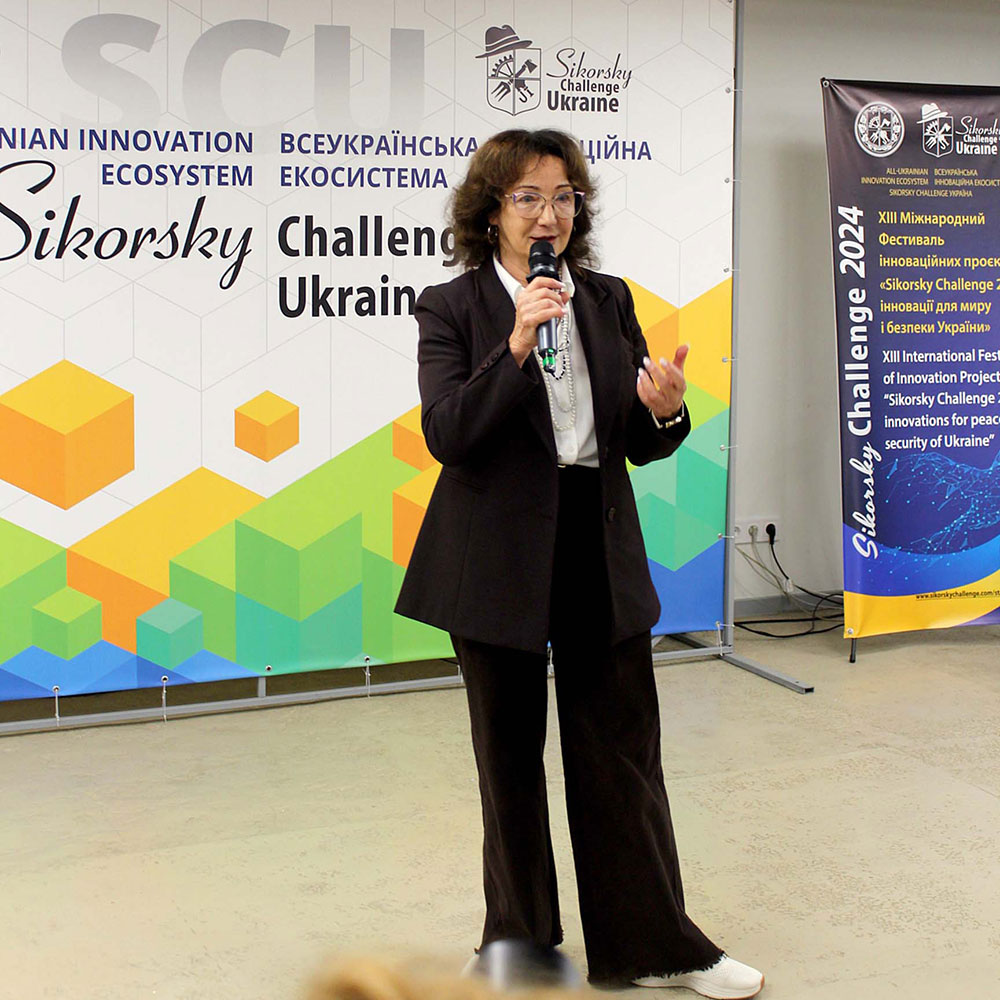
All of this was a real confirmation of the words of Oleksandr Kornienko, First Deputy Chairman of the Verkhovna Rada of Ukraine, who addressed the festival participants: “Events such as the Sikorsky Challenge Festival are a unique opportunity to find each other: for creators and developers of new equipment and technologies to present their ideas, inventions, developments and prototypes; for businesses to understand where they can get personnel, experts, where they can get really working models that can be invested in. It's good that this is happening on the site of one of the largest and most famous universities not only in Ukraine but also in Europe, a university with traditions. And we understand that the National Technical University of Ukraine “Igor Sikorsky Kyiv Polytechnic Institute” is a forge of engineers, inventors, startups - all those who ensure that our victory is coming closer. And this is true, because it is impossible to move forward without engineering education, without engineers, to develop the industries that we really need - and these are energy and ecology, food security, biomedicine and bioengineering, and, of course, the defense industry. All of them are represented in the panels and sections of the festival: the program covers the variety of tasks facing the real sector of the Ukrainian economy.”
In his speech, Dmytro Hryshchak, Deputy Minister for Strategic Industries of Ukraine, reminded the audience of the long-term cooperation between the Ministry and Igor Sikorsky Kyiv Polytechnic Institute and that it is not the first time that its representatives have participated in the Sikorsky Challenge festival, which, in his opinion, is a point of development for the domestic defense industry and the whole of Ukraine. In particular, he drew the attention of polytechnic students to jobs in the defense industry and invited them and other festival participants to work. “It is quite obvious that the issues of this industry are in demand by the state today. It should be understood that Ukraine, unfortunately, has become a testing ground for the latest military equipment of the enemy, ours and our partners. Therefore, the defense industry is a growth point. Of course, the war will end with our victory, and we will gain powerful potential and creative inspiration to enter the global military market and occupy certain segments.”
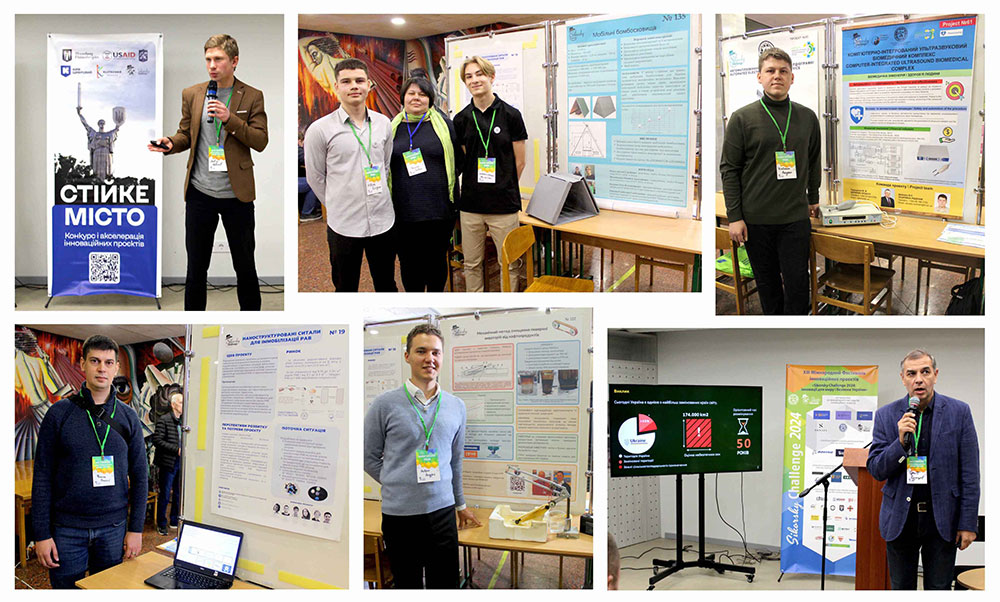
The main direction and focus of the expert discussions and debates was set, of course, by the forum “Innovations in the Defense Industry”, which opened the events of the festival program and was skillfully moderated by the director of the Institute of Advanced Defense Technologies of the University Yuriy Yekhanurov. He noted that the subject of discussion at the forum should be not only issues related to the state's defense industry, but also those related to the country's economic growth model after the war, which could be based, among other things, on the development and construction of the domestic defense industry and the use of its export capabilities. But the main issues were, of course, the creation of modern weapons to defend our country and ensuring the conditions for this. “War is a combination of people and weapons. The question is in proportions. We are moving towards high-tech weapons precisely to save the lives of servicemen,” emphasized Colonel Andriy Lebedenko, Deputy Commander-in-Chief of the Armed Forces of Ukraine. At the forum, experts discussed, among other things, the most pressing problems of defense companies, regardless of their form of ownership, as well as opportunities and prospects for solving them. The participants recognized the problem of a constant shortage of working capital as one of the most painful, especially for private manufacturers, which usually respond much more quickly than state-owned ones to new needs of the Ukrainian Defense Forces, but are unable to quickly scale their developments. Industry representatives see a way out of this situation in the state's authorization of controlled exports of military and dual-use products. Another problem is a certain disconnect between the activities of enterprises and the research and achievements of Ukrainian science. In this context, the panelists acknowledged that Igor Sikorsky Kyiv Polytechnic Institute is currently developing an effective model for integrating researchers and developers with manufacturers and business leaders who believe in investing in science. However, the administrative system for bringing products to consumers who desperately need them remains complicated and confusing. An interesting figure was mentioned during the discussion: while at the beginning of 2022 there were 7 drone manufacturers in the country, and 3 of them were almost bankrupt, now the number of such manufacturers in our market is 100 times higher, although their technical equipment and capabilities are very different. It is worth noting that the forum was attended by high-ranking government officials, so we can hope that the proposals of scientists and producers to remedy the situation were not only heard, but also have a chance to be taken into account in the work of the relevant agencies. However, for obvious reasons, it is simply not worth talking about the details of this conversation and the projects presented in the first section.
In fact, it is impossible to tell in detail about the festival's finalist projects from other sections, as this would require more than one newspaper page. It is no coincidence that their authors also presented these developments in pitch presentations, which could be seen and heard by both festival participants who gathered in the hall and those who were far from Kyiv, and at the stands. Often, the authors of the developments demonstrated not only posters but also models or prototypes of the proposed instruments, devices, units, tools and systems, or even finished products that require scaling up. There, one could also learn about the purpose and characteristics of new equipment and technologies, the specifics of their implementation, and the required amount of investment.
The areas of activity and search of the authors of the developments that took part in the startup competition were very different even within the same section.
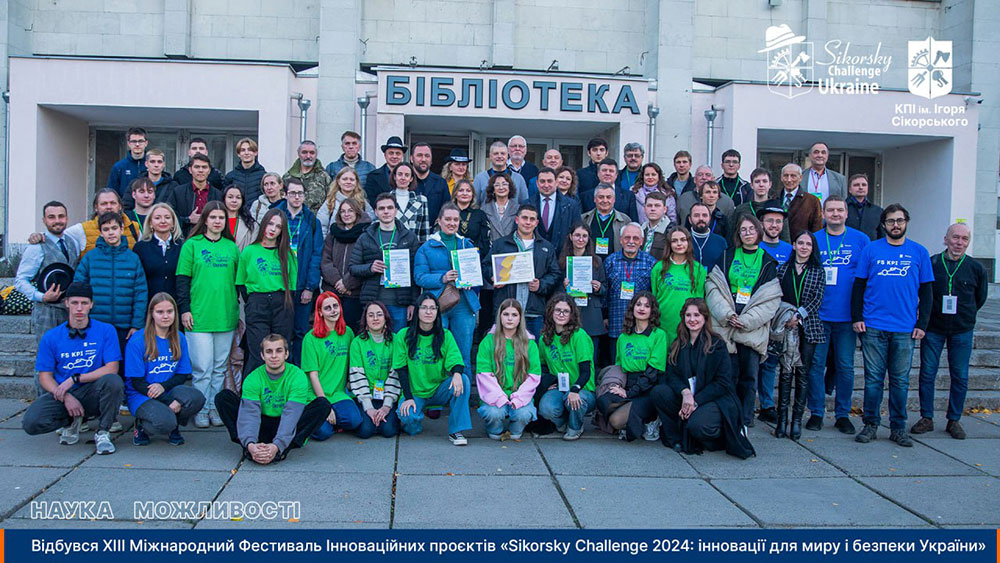
For example, in the Energy Sustainability and Security section, the projects Window Insulation (with developed and tested prototype components) and Wind Turbine from Recycled Comosite Material (with proven workable technology) were presented, “Solar panel recycling technology” (the final prototype has been tested and documentation for mass production has already been prepared) and ‘Technology for converting a domestic boiler to water-emulsion fuel’ (with a prototype developed for demonstration in a working environment), etc. (by the way, during this section, the participants discussed innovative solutions in the field of energy efficiency and security of Kyiv's urban infrastructure. The winning projects of the Sustainable City Competition were presented and information on their implementation was provided). In the section “Environmental Safety and Humanitarian Demining”, the projects “System of Cheap Insulation of Building Facades” (with a prototype developed for demonstration in the working environment), “Humanitarian Demining SOCRAT” (with a prototype developed for demonstration in the working environment), “Protection of Aquatic Ecosystems from Pollution by Mineralized Wastewater” (proven workable technology), and others competed. The developments presented in the Biomedical Engineering and Human Health section were also very diverse: the projects “Braille e-book” (with developed and tested prototype units or components), “NOVA| prosthetic legs for all” (the final prototype of this development has been tested, documentation for mass production has been prepared), and several others.
In fact, completely different projects, which were united not so much by a conditional common focus as by their focus on solving very specific problems, were presented to the jury in all sections without exception.
As for the specific direction of the developments, it is worth focusing on one project that has become a clear illustration of this. It is the project “Radio-controlled machine for field soil preparation” in the section “Agrotech and Food Security”, for which a prototype has already been developed for demonstration in the working environment. It was presented by Vladyslav Sergienko, a farmer from Zaporizhzhia region and first deputy chairman of the Assembly of Agrarian Enterprises of Ukraine. Behind the seemingly “peaceful” name of the project is a development that aims to provide the possibility of field work without risking the lives of farmers living in areas close to the war zone or liberated from the enemy. This risk is created by mines left behind or remotely scattered by the Rashists, unexploded ammunition and explosive residues. This is a really burning problem for agricultural workers, especially in regions close to the frontline. The terrible remnants of battles and deadly “souvenirs” scattered on Ukrainian soil by the insidious enemy have already claimed many lives of farmers. That's why the developers proposed a project for a robotic tracked machine that can be controlled by an operator from a distance of up to 2 kilometers using a radio control system with a mast of up to 7 meters. The machine has a front linkage of several sections, which is actually a working body for demining by detonating mines and can be equipped with interchangeable tools such as a cultivator, disk harrow, digger, and others. It can also pull the rear suspension for additional tillage and even sowing. And this is just one of the many projects presented at the festival that were created to overcome the consequences of the war. There is much more to write about them, because there were practically no weak works in the final.
Of course, the jury recognized the winners as extremely interesting developments. (For more information about them, see the website of the All-Ukrainian Innovation Ecosystem “Sikorsky Challenge Ukraine” https://www.sikorskychallenge.com).
Summarizing the results of the XIII Sikorsky Challenge Festival, Inna Maliukova, Head of the All-Ukrainian Innovation Ecosystem Sikorsky Challenge Ukraine, shared her plans for the next one. “There are a lot of projects that can cooperate. And we always work with project teams to look for customers, investors, business angels,” she said, ”So I think another area of work could be to analyze the submitted projects and bring some of them together to strengthen each other. We will see the effect of this at the fourteenth festival.”
Finally, we should mention those without whom this festival would not have been possible.
So, its organizers are: Ministry of Education and Science of Ukraine, Igor Sikorsky Kyiv Polytechnic Institute, Sikorsky Challenge Ukraine Innovation Ecosystem, Ministry of Digital Transformation of Ukraine, Leonid Kuchma Presidential Foundation “Ukraine”, Sonata.
General sponsors: Boeing Ukraine, Kolo Charitable Foundation, Exchange University Training Center.
Sponsors: Ukrainian Freedom Fund, GIST, Transfotech, Awedyne, Center for Resource Efficient and Cleaner Production.
Partners: Ukrainian Startup Fund, Brave1 Ukrainian Defense Innovations, League of Defense Enterprises of Ukraine, Association of Ukrainian Defense Manufactures, OJSC “Meridian named after S.P. Korolyov”, Progresstech-Ukraine, Kyiv City State Administration, USAID, GIZ, Vector Aviation Company, Svichado Charitable Foundation, Startup Mastery, Winner, Ukrainian Cluster Alliance, Mosqitter, V.S. Mikhalevich Foundation for Scientific and Technological Development of Ukraine, and others. Cognitive Research Labs, Association of Industrial Automation Enterprises of Ukraine, Parashar Industries, Ukrainian Peace Council, and the International Public Organization Environmental Safety Council.
And finally, it is worth mentioning at least in passing the helpers who are not often written about, but whose work is important for the success of the festival. We are talking about student volunteers. “Every year we invite students to work at this festival,” Natalia Pozharska, head of the career guidance department at the DNVR Career Development Center, told the editorial board, ”It's all voluntary, we opened a form and invited students to join this process. More than 30 people registered. Not all of them were able to take part in this work because of their academic workload, so about 22-23 students from different faculties worked in shifts at the festival.”
So, the Sikorsky Challenge 2024 festival is now over. On November 4, work began on the preparation of the Sikorsky Challenge 2025 festival.
Igor Sikorsky Kyiv Polytechnic Institute hosted the International Festival of Innovative Projects ‘Sikorsky Challenge 2024: Innovations for Peace and Security of Ukraine’.
During the Festival from 29 October to 1 November 2024:
📌 More than 65 finalists presented innovative projects at pitchings to experts, investors and important stakeholders in the field of projects.
📌 More than 70 experts from Ukraine, the UK, USA, Spain, Poland, Latvia, Georgia, Japan, Saudi Arabia, etc. discussed topical issues of innovative development and the importance of startups for Ukraine's victory and post-war recovery during 5 thematic panel discussions in offline and online formats. Among the experts were representatives of public authorities, Ukrainian and international participants of the Sikorsky Challenge Ukraine Innovation Ecosystem, representatives of Ukrainian and international funds, etc.
📌 Important events took place:
- Forum ‘Innovations in the Defence Industry’;
- International Forum ‘International Support for Innovative Transformation of Ukraine’;
- Presentation of the Sikorsky Challenge Immersive Virtual Exhibition.
In total, 140 projects were submitted for participation in 8 sections:
1. Aviation, space, defence and security.
2. Energy Sustainability and Security.
3. Environmental safety and humanitarian demining.
4. Biomedical engineering and human health.
5. Digital country, artificial intelligence, cybersecurity.
6. Infrastructure and industrial high-tech.
7. Agrotech and food security.
8. Sikorsky Challenge Junior.
We will soon publish a series of posts about the work of the sections and panel discussions.
P.S. The festival lasted for almost a week, the photos show only a part of the participants, speakers, organisers and volunteers.
Organisers.
The Ministry of Education and Science of Ukraine, Igor Sikorsky Kyiv Polytechnic Institute, Sikorsky Challenge Ukraine Innovation Ecosystem, Ministry of Digital Transformation of Ukraine, Leonid Kuchma Presidential Foundation ‘Ukraine’, Sonata.
General sponsors
Boeing Ukraine, Kolo Charitable Foundation, Exchange University Training Centre.
Sponsors
Ukrainian Freedom Fund, GIST, Transfotech, Awedyne, Centre for Resource Efficient and Cleaner Production.
Partners
Ukrainian Startup Fund, Brave1 Ukrainian Defence Innovations, League of Defence Enterprises of Ukraine, Association of Ukrainian Defence Manufactures, Meridian named after S.P. Korolyov, Progresstech-Ukraine, Kyiv City State Administration, USAID, GIZ, Vector Aviation Company, Svichado Charitable Foundation, Startup Mastery, Winner, Ukrainian Cluster Alliance, Mosqitter, V.S. Mikhalevich Foundation for Scientific and Technical Development of Ukraine, and others. Cognitive Research Labs, Association of Industrial Automation Enterprises of Ukraine, Parashar Industries, Ukrainian Peace Council, International NGO Environmental Safety Council.

